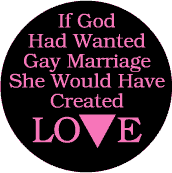
Well there's been a lot of news about same sex marriage in the last couple of weeks, and you know what, I really welcome it.
Certainly many Catholic and Anglican clerics have been making a big sound about being against it, but I sort of welcome that too, in a way.
The conversation has started! And that has got to be a good thing. When I returned to the UK in 2005 after personally witnessing the first same sex marriages in America I was frustrated that marriage equality just didn't seem to be on anyone's agenda in the UK. It just wasn't on the table.
Well it's on the table now. The UK government are launching a consultation very soon about marriage equality in England and Wales and they're already a step ahead of that in Scotland. We're having the debate, and I'm glad about that because it's the first time it's really happened.
For most people this is a novel idea, so I think most people haven't really made up their minds yet, and are listening to the debate, so let's have it.
Marriage equality is about equality. This is the crux of the matter, and it's the point that is disputed. I'm not going to bother arguing against the slightly mad ramblings of Cardinal Keith O Brien, but I do want to engage with the arguments I've heard from Vincent Nichols, the Catholic Archbishop of Westminster (a clearly more sane and sensible person). His position is that marriage is "distinctly" a heterosexual affair.
This is the argument of "separate but equal" which says we have civil partnerships, so why do we need marriage? This argument is accepted by many, including some in the GLBT community.
But is "separate but equal" really possible? Imagine if we said that black people were allowed to have civil partnerships, but weren't allowed to call them "marriage." Imagine we said that marriage is a distinctly white institution, and we wanted to keep it that way. What would black people have to complain about? They have civil partnerships don't they? That gives them legal protection. They could say, as Vincent Nichols (apparently) quoted a gay couple saying "we're a small minority and we don't want to upset the majority so let's stay quiet."
We would very clearly see racist assumptions under such a system, and rightly reject them. If we really believe in equality, then why would it need to be separate?
But perhaps the analogy is not perfect. No analogy is. Because in a sense the current system does not discriminate against individuals, it discriminates against couples. Can we claim the same right to a couple as we would for an individual? Should couples receive equal treatment under the law the same way we would want an individual to be treated equally? In a sense no indivdual is banned from a different sex marriage, they are just banned from a same sex marriage. In that sense all individuals are being treated equally.
So how about another analogy. Imagine same-race couples could have marriages but mixed-race couples had to have civil partnerships. If you married someone of the same race you could have a marriage, but if you loved someone of a different race, then you had to have a civil partnership. This would not be discriminating against individuals, but it would be disciminating against couples. An individual would have the right to a same race marriage, they would just be banned from a mixed race marriage. Again the individual would still be treated equally.
Would we not still see this as racist? Would we not ask "why should race make any difference at all to the validity of a marriage?"
Equally we could ask "why should biological sex make any difference at all the the validity of a marriage?"
And make no mistake, what this is fundamentally about gender. Heterosexism is one room in the mansion of sexism. The arguments against same sex marriage are based on a certain understanding of the nature of women and men, and the differences between them. The opponents of same sex marriage believe that women are fundamentally different creatures from men. That's why you need one each for a marriage. There is a huge chasm between men and women and that's why there is a huge chasm between same-sex relationships and different sex relationships.
But if we see people as fundamentally human before they are men and women, then the difference between heterosexual and homosexual is considerably lessened.
The Catholic argument against same sex marriage is based explicitly on natural law ethics. In this philosophy things are created for a purpose. Women are created to find fulfilment in men and men are created to find fulfilment in women. Both are created for the biological purpose of procreation. The trouble is this neat philosophy does not recognise the complexity of what it is to be human. It does not recognise the natural diversity of human sexuality, and the possibility of finding fulfilment in same sex relationships. It is based on "human nature" but it's view of human nature is wrong, it is wrong scientifically, and therefore wrong ethically.
Comments